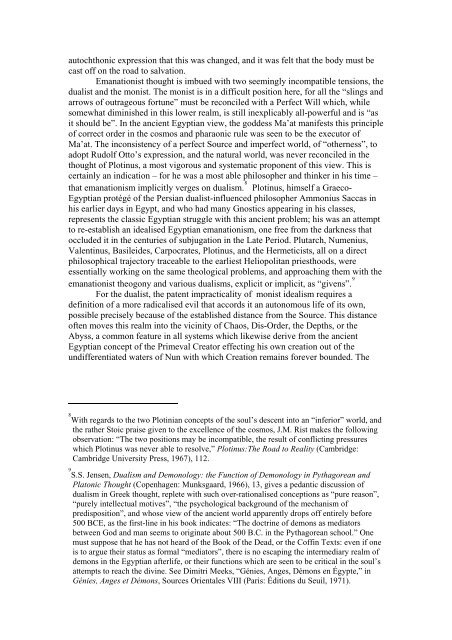THE EGYPTIAN FOUNDATIONS OF GNOSTIC THOUGHT
THE EGYPTIAN FOUNDATIONS OF GNOSTIC THOUGHT
THE EGYPTIAN FOUNDATIONS OF GNOSTIC THOUGHT
Create successful ePaper yourself
Turn your PDF publications into a flip-book with our unique Google optimized e-Paper software.
autochthonic expression that this was changed, and it was felt that the body must be<br />
cast off on the road to salvation.<br />
Emanationist thought is imbued with two seemingly incompatible tensions, the<br />
dualist and the monist. The monist is in a difficult position here, for all the “slings and<br />
arrows of outrageous fortune” must be reconciled with a Perfect Will which, while<br />
somewhat diminished in this lower realm, is still inexplicably all-powerful and is “as<br />
it should be”. In the ancient Egyptian view, the goddess Ma’at manifests this principle<br />
of correct order in the cosmos and pharaonic rule was seen to be the executor of<br />
Ma’at. The inconsistency of a perfect Source and imperfect world, of “otherness”, to<br />
adopt Rudolf Otto’s expression, and the natural world, was never reconciled in the<br />
thought of Plotinus, a most vigorous and systematic proponent of this view. This is<br />
certainly an indication – for he was a most able philosopher and thinker in his time –<br />
that emanationism implicitly verges on dualism. 8<br />
Plotinus, himself a Graeco-<br />
Egyptian protégé of the Persian dualist-influenced philosopher Ammonius Saccas in<br />
his earlier days in Egypt, and who had many Gnostics appearing in his classes,<br />
represents the classic Egyptian struggle with this ancient problem; his was an attempt<br />
to re-establish an idealised Egyptian emanationism, one free from the darkness that<br />
occluded it in the centuries of subjugation in the Late Period. Plutarch, Numenius,<br />
Valentinus, Basileides, Carpocrates, Plotinus, and the Hermeticists, all on a direct<br />
philosophical trajectory traceable to the earliest Heliopolitan priesthoods, were<br />
essentially working on the same theological problems, and approaching them with the<br />
emanationist theogony and various dualisms, explicit or implicit, as “givens”. 9<br />
For the dualist, the patent impracticality of monist idealism requires a<br />
definition of a more radicalised evil that accords it an autonomous life of its own,<br />
possible precisely because of the established distance from the Source. This distance<br />
often moves this realm into the vicinity of Chaos, Dis-Order, the Depths, or the<br />
Abyss, a common feature in all systems which likewise derive from the ancient<br />
Egyptian concept of the Primeval Creator effecting his own creation out of the<br />
undifferentiated waters of Nun with which Creation remains forever bounded. The<br />
8<br />
With regards to the two Plotinian concepts of the soul’s descent into an “inferior” world, and<br />
the rather Stoic praise given to the excellence of the cosmos, J.M. Rist makes the following<br />
observation: “The two positions may be incompatible, the result of conflicting pressures<br />
which Plotinus was never able to resolve,” Plotinus:The Road to Reality (Cambridge:<br />
Cambridge University Press, 1967), 112.<br />
9<br />
S.S. Jensen, Dualism and Demonology: the Function of Demonology in Pythagorean and<br />
Platonic Thought (Copenhagen: Munksgaard, 1966), 13, gives a pedantic discussion of<br />
dualism in Greek thought, replete with such over-rationalised conceptions as “pure reason”,<br />
“purely intellectual motives”, “the psychological background of the mechanism of<br />
predisposition”, and whose view of the ancient world apparently drops off entirely before<br />
500 BCE, as the first-line in his book indicates: “The doctrine of demons as mediators<br />
between God and man seems to originate about 500 B.C. in the Pythagorean school.” One<br />
must suppose that he has not heard of the Book of the Dead, or the Coffin Texts: even if one<br />
is to argue their status as formal “mediators”, there is no escaping the intermediary realm of<br />
demons in the Egyptian afterlife, or their functions which are seen to be critical in the soul’s<br />
attempts to reach the divine. See Dimitri Meeks, “Génies, Anges, Démons en Égypte,” in<br />
Génies, Anges et Démons, Sources Orientales VIII (Paris: Éditions du Seuil, 1971).










